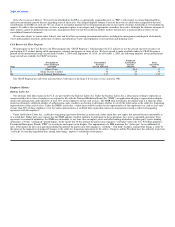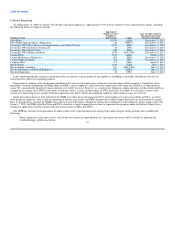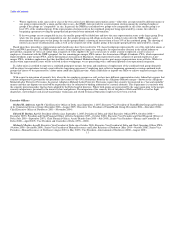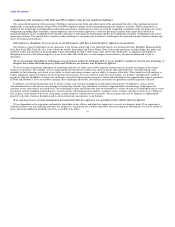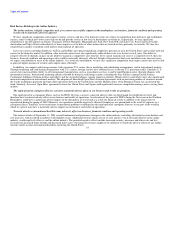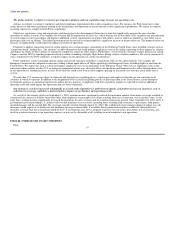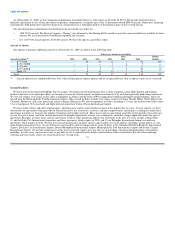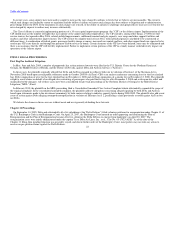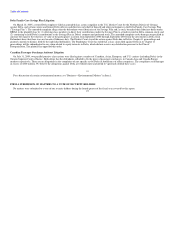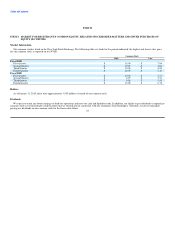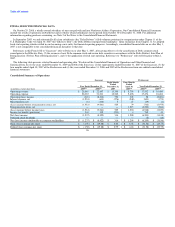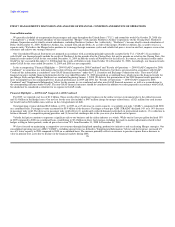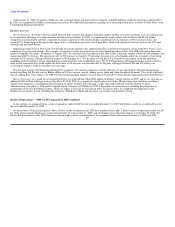Delta Airlines 2009 Annual Report Download - page 24
Download and view the complete annual report
Please find page 24 of the 2009 Delta Airlines annual report below. You can navigate through the pages in the report by either clicking on the pages listed below, or by using the keyword search tool below to find specific information within the annual report.
Table of Contents
The airline industry is subject to extensive government regulation, and new regulations may increase our operating costs.
Airlines are subject to extensive regulatory and legal compliance requirements that result in significant costs. For instance, the FAA from time to time
issues directives and other regulations relating to the maintenance and operation of aircraft that necessitate significant expenditures. We expect to continue
incurring expenses to comply with the FAA's regulations.
Other laws, regulations, taxes and airport rates and charges have also been imposed from time to time that significantly increase the cost of airline
operations or reduce revenues. For example, the Aviation and Transportation Security Act, which became law in November 2001, mandates the federalization
of certain airport security procedures and imposes additional security requirements on airports and airlines, most of which are funded by a per ticket tax on
passengers and a tax on airlines. The federal government has on several occasions proposed a significant increase in the per ticket tax. The proposed ticket tax
increase, if implemented, could negatively impact our results of operations.
Proposals to address congestion issues at certain airports or in certain airspace, particularly in the Northeast United States, have included concepts such as
"congestion-based" landing fees, "slot auctions" or other alternatives that could impose a significant cost on the airlines operating in those airports or airspace
and impact the ability of those airlines to respond to competitive actions by other airlines. Furthermore, events related to extreme weather delays have caused
Congress and the DOT to consider proposals related to airlines' handling of lengthy flight delays during extreme weather conditions. The recent enactment of
such a regulation by the DOT could have a negative impact on our operations in certain circumstances.
Future regulatory action concerning climate change and aircraft emissions could have a significant effect on the airline industry. For example, the
European Commission has adopted an emissions trading scheme applicable to all flights operating in the European Union, including flights to and from the
United States. We expect that such a system will impose significant costs on our operations in the European Union. Other laws or regulations such as this
emissions trading scheme or other U.S. or foreign governmental actions may adversely affect our operations and financial results, either through direct costs
in our operations or through increases in costs for jet fuel that could result from jet fuel suppliers passing on increased costs that they incur under such a
system.
We and other U.S. carriers are subject to domestic and foreign laws regarding privacy of passenger and employee data that are not consistent in all
countries in which we operate. In addition to the heightened level of concern regarding privacy of passenger data in the United States, certain European
government agencies are initiating inquiries into airline privacy practices. Compliance with these regulatory regimes is expected to result in additional
operating costs and could impact our operations and any future expansion.
Our insurance costs have increased substantially as a result of the September 11, 2001 terrorist attacks, and further increases in insurance costs or
reductions in coverage could have a material adverse impact on our business and operating results.
As a result of the terrorist attacks on September 11, 2001, aviation insurers significantly reduced the maximum amount of insurance coverage available to
commercial air carriers for liability to persons (other than employees or passengers) for claims resulting from acts of terrorism, war or similar events. At the
same time, aviation insurers significantly increased the premiums for such coverage and for aviation insurance in general. Since September 24, 2001, the U.S.
government has been providing U.S. airlines with war-risk insurance to cover losses, including those resulting from terrorism, to passengers, third parties
(ground damage) and the aircraft hull. The coverage currently extends through August 31, 2010. The withdrawal of government support of airline war-risk
insurance would require us to obtain war-risk insurance coverage commercially, if available. Such commercial insurance could have substantially less
desirable coverage than that currently provided by the U.S. government, may not be adequate to protect our risk of loss from future acts of terrorism, may
result in a material increase to our operating expenses or may not be obtainable at all, resulting in an interruption to our operations.
ITEM 1B. UNRESOLVED STAFF COMMENTS
None. 19


